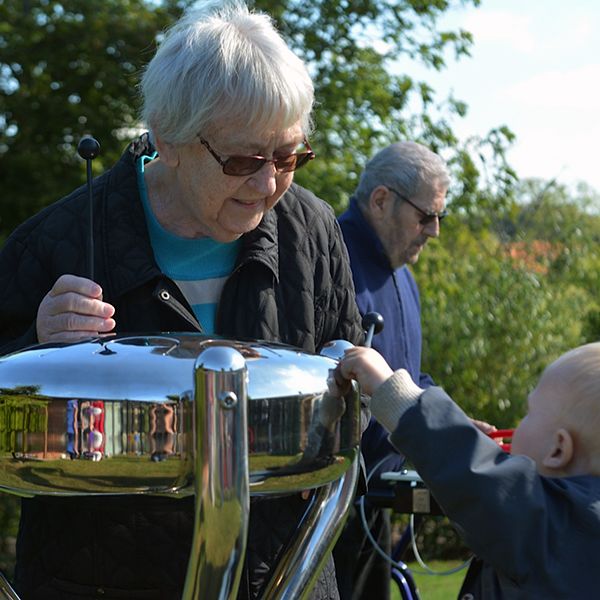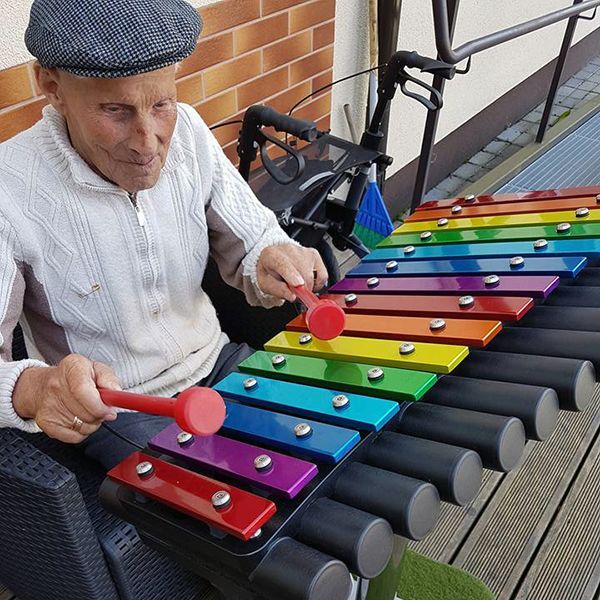Outdoor Musical Activities For Seniors and Promoting Harmony in Dementia Care
Dementia Friendly Gardens
Being outside is necessary for well-being and enjoyment of life itself, and a number of Care and Nursing Homes are seeing the benefits of creating dementia-friendly sensory gardens for residents and visitors to enjoy, creating little sanctuaries that appeal to all the senses through the creative use of colors, smells, textures, and sounds.
As many care home residents have either visual or hearing impairments, a sensory garden can and should be designed to stimulate the whole range of human senses. Carefully laid-out benches, plants, walkways, and fountains provide a perfect setting within which to relax and enjoy the visual and audible ambiance. Residents, family, and friends can all reap the health benefits associated with sunshine and fresh air whilst also benefiting from the added sensory stimulation. Sensory gardens can serve many functions and can be designed for socializing, healing, and horticultural therapy.

Music In the Gardens
Music is important in all aspects of life and a crucial factor in any sensory environment. A musical sound garden combines the benefits of a sensory garden with playing musical instruments - an increasingly popular care home activity. Creating a sound garden for residents will engage their senses whilst having a little fun - an invitation to experience the outdoors in a new and fascinating way. Music motivates, enriches, touches, relaxes, and energizes seniors in nursing homes. A harmonic sound garden creates a totally interactive outdoor soundscape that pleases the eye and enchants the ear. A sensory sound garden is a multi-generational attraction that lures residents and visitors to the outdoors to gather at all times of the year to play the instruments – it’s difficult to go into a sound garden and not interact with the others who are experimenting with the different sounds created by the instruments.

Music & Therapy In The Gardens
Much research has been carried out on the therapeutic benefits and potential that music has in nursing homes. It can enhance well-being and alleviate symptoms such as agitation, anxiety, and depression. The effect of playing music can be simultaneously stimulating and soothing - stimulating the primary senses, hearing, touching, and seeing, can help calm and relax patients when stressed. At the same time, playing the instruments can provide a good environment for bonding between an Alzheimer patient and his or her therapist or between a resident and family members.

Music-Making For Residents, Carers and Visitors
We know that all activities are important for residents, visitors, and staff, helping to ensure a vibrant and stimulating atmosphere, relieve boredom, and provide an extra sparkle to life. A musical sound garden hits all the right notes for activities directors who want to use music in their nursing home activities programs. Music "speaks" to all of us, regardless of our language, culture, or abilities, and it can be used effectively with groups and individuals in nursing homes to encourage the expression of feeling and increase socialization . Playing music helps to improve concentration, increases mobility and coordination, reduces tension, and promotes relaxation. A sound garden enables residents to react and interact with their environment, thus providing a healing outdoor experience.

Visitors to the garden can compare and contrast the sounds made by different materials. Instruments made with timber emit pure and natural sounds, a full and rich tone that is low in pitch and very pleasing to the ear. Metal instruments produce a lovely clear note when hit, which is bright and penetrating. Outdoor musical instruments tuned to the pentatonic scale make playing effortless as the notes within the scale all harmonize with one another, so there are no discordant notes, compelling even the non-musical to pick up a mallet and play, producing new and original melodies each time.
The unique element of a sound garden is that it is not just a green space but also a therapeutic, interactive tool. Imagine sculptures and musical instruments placed alongside winding wheelchair-friendly paths that engage residents in activities that create soothing sounds, encourage self-expression, improve cognitive skills, support social interactions, and motivate residents to go outdoors to enjoy the open air.
Providing outdoor musical activities is a wonderful idea when designing such areas. It will hopefully encourage more outdoor living and greater physical activity.
The video below is a collection of short videos taken in numerous care homes and elder centers where outdoor musical instruments have proven to be both beneficial and fun.
{}
